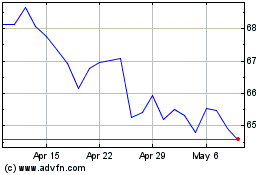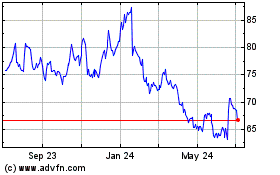Gilead Reports Drop in Hepatitis C Drug Revenue -- Update
April 28 2016 - 6:11PM
Dow Jones News
By Lisa Beilfuss
Gilead Sciences Inc. said revenue from its hepatitis C drugs
fell 5.6% in the first quarter as sales of Harvoni and Sovaldi fell
short of expectations, suggesting competition is eating into the
company's hold on a hot corner of the drug market.
Shares in the company slid 6.6% in after-hours trading.
The Foster City, Calif., biopharmaceutical company dominates the
market for treating hepatitis C, inflammation of the liver that
doesn't always show symptoms. The contagious disease affects about
3.5 million people in the U.S., according to the Centers for
Disease Control and Prevention.
In the first quarter, Gilead said sales of Harvoni, its newer
treatment, fell 16% to $3.02 billion. Analysts were looking for
$3.15 billion, according to FactSet. Meanwhile, Sovaldi sales
jumped 31%, to $1.27 billion, but the increase fell short of
expectations amid soft European markets. Analysts had projected a
34% rise in Sovaldi sales to $1.30 billion.
Gilead is facing growing competition in the booming hepatitis
space. During the quarter, pharmaceutical giant Merck & Co.
launched a new treatment that costs 30% less than rival drugs and
comes in the form of a once-daily pill. Meanwhile, AbbVie Inc.
markets Viekira Pak, a competing and similarly costly treatment it
launched in late 2014. Gilead has managed to protect much of its
market share, but analysts have cautioned that pressure is heating
up. "People are worried about the hepatitis C market," said RBC
analyst Michael Yoon. "Prices have gone down [and] there's
increased competition," he said.
Earlier Thursday, AbbVie reported a 79% increase in
first-quarter Viekira Pak sales, to $414 million, but that result
also fell short of expectations. Analysts similarly pointed to
competition from Merck's new drug.
For Gilead, Harvoni and Sovaldi make up about two-thirds of the
company's business. A chunk of the rest is from the company's HIV
portfolio, what it was originally known for. Sales of Atripla,
Gilead's top HIV drug, unexpectedly declined 8%, to $675 million.
Analysts expected the treatment to bring in $742 million. Its No. 2
HIV medicine, Stribild, also disappointed.
In all for the quarter, Gilead reported a profit of $3.57
billion, or $2.53 a share, down from $4.33 billion, or $2.76 a
share, a year earlier. Excluding acquisition-related expenses,
stock-based compensation and other items, per-share profit rose to
$3.03 from $2.94. The first-quarter result included a litigation
charge stemming from the aforementioned patent settlement that took
a dime off earnings per share.
Total product sales rose 3.7% to $7.68 billion. Analysts
projected $3.15 in adjusted earnings per share on $8.12 billion in
sales, according to Thomson Reuters.
The company backed its guidance for the year, still projecting
$30 billion to $31 billion in total sales.
Write to Lisa Beilfuss at lisa.beilfuss@wsj.com
(END) Dow Jones Newswires
April 28, 2016 17:56 ET (21:56 GMT)
Copyright (c) 2016 Dow Jones & Company, Inc.
Gilead Sciences (NASDAQ:GILD)
Historical Stock Chart
From Mar 2024 to Apr 2024

Gilead Sciences (NASDAQ:GILD)
Historical Stock Chart
From Apr 2023 to Apr 2024
